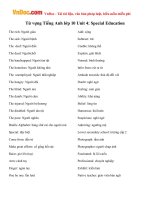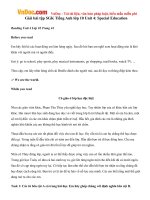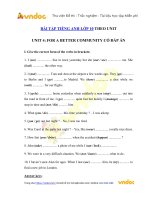Bài giảng Tiếng Anh lớp 10 Unit 4: Special Education (Language Focus) - Trường THPT Bình Chánh
Bạn đang xem bản rút gọn của tài liệu. Xem và tải ngay bản đầy đủ của tài liệu tại đây (1.09 MB, 17 trang )
TRƯỜNG THPT BÌNH CHÁNH
TỔ NGOẠI NGỮ
TIẾNG ANH 10
UNIT 4:
SPECIAL EDUCATION
PART E –LANGUAGE FOCUS
A- PRONUNCIATION
/ɒ/ - /ɔ:/
-
/ ɒ /: thường viết là “o”
-
/ɔ : /:thường viết là “or, our, a”
* Listen and repeat
/ɒ/
top /tɒp/
/ɔ:/
wrong /rɒη/
call /kɔ:l/
walking /wɔ:kiη/
boss /bɒs/
job /dʒɒb/
sport /spɔ:t/
more /mɔ:/
doctor /dɒktə/
box /bɒks/
four /fɔ:/
talk /tɔ:k/
Practise these sentences:
/ɒ/
/ɒ/
/ɒ/
1. Put the socks on top of the box.
/ɒ/
/ɒ/
/ɒ/
/ɒ/
2. He lost his job as a doctor in the hospital.
/ɒ/
/ɒ/
3. What's wrong with you, boss?
/ɔ:/
/ɔ:/
/ɔ:/
4. Is walking called a sport?
/ɔ:/
/ɔ:/
5. He can't talk to her any more.
/ɔ:/
/ɔ:/
/ɔ:/
6. Four of us have walked for fourteen miles.
Choose the word whose underlined part is pronounced
differently from the rest:
1. A. top
B. job
C. call
D. box
2. A. doctor
B. four
C. talk
D. more
3. A. sport
B. wrong
C. walk
D. award
4. A. biology B. crop
C. box
D. water
5. A. rock
C. door
D. short
B. quarter
B- Grammar and vocabulary
I. The + adj
II. Used to + Vo
III. Which (dùng như từ nối)
I. The + adj → N tập hợp chỉ người (số nhiều)
The poor always need the help from all
people in the society.
The poor
The young have the future in their
hands.
The young
Matching
C
1. The sick
2. The homeless
A
3. The injured
4. The unemployed
B
D
Exercises
Exercise 1: Complete these sentences, using the + one of the
adjectives:
injured
poor
rich
sick
unemployed
young
1.
have the future in their hands.
2. Ambulances arrived at the scene of the accident and took
to hospital.
3. Life is all right if you have a job, but things are not so easy
for
.
4. Julia has been a nurse all her life. She has spent her life caring
for
.
5. In England there is an old story about a man called Robin Hood. It is
said that he robbed
and gave the money to
.
II. Used to: đã từng (thói quen ở QK)
(+) S+ used to +Vo
(-) S + didn’t + use to + Vo
(?) Did + S + use to + Vo?
I used to live there when I was a child.
(-) I didn’t use to live there when I was a child.
(?) Did you use to live there when you were a child ?
Fill in the blank with used to and a suitable verb, then change
the sentence into negative and question form.
I
fishing when I lived in the countryside.
(-) I
fishing when I lived in the countryside.
(?)
fishing when you lived in the countryside?
Fill in the blank with used to and a suitable verb, then change the
sentence into negative and question form.
He
soccer for the school team when he was a student.
(-) He
soccer for the school team when he was a student.
(?)
soccer for the school team when he was a student?
Exercise 2- Complete the sentences with used to + a suitable verb.
smoke
eat
go
be
be
take
have
live
1. Dennis gave up smoking two years ago. He
40
cigarettes a day.
2. Liz
a motorbike, but last year she sold it and
bought a car.
3. We came to live in Manchester a few years ago. We
in
Nottingham.
4. I rarely eat ice cream now, but I
it when I was a child.
5. Jim
my best friend, but we aren't friends any longer.
6. It only takes me about 40 minutes to get to work since the new road
was opened. It
more than an hour.
7. There
a hotel opposite the station, but it closed a
long time ago.
8. When you lived in London,
to the theatre?
III. Which (dùng như từ nối)
Which dùng thay cho ý của cả mệnh đề phía trước, có dấu
phẩy. Khi nối 2 câu, which thay thế cho this, that, it ở câu 2.
1. She didn’t come to the party. That made me sad.
→ She didn’t come to the party, which made me sad.
2. Jill always comes to class late. This makes the teacher angry.
→ Jill always comes to class late, which makes the teacher angry.
Exercise 3: Join a sentence from A with one from B to make a new
sentence. Use which.
A
B
1. Sheila couldn't come to the
a. This was very nice of her.
party.
b. This means we can't go away
2. Jill isn't on the phone.
tomorrow.
3. Neil has passed his
c. This makes it difficult to
examinations.
contact her.
4. Our flight was delayed.
d. This makes it difficult to sleep.
5. Ann offered to put me up for
e. This was a pity.
the night.
f. This is good news.
6. The street I live in is very
g. This meant we had to wait for
noisy at night.
hours
thea pity.
airport.
1. Sheila couldn’t come to the party,
whichatwas
7. Our car has broken down.
Example: 1. Sheila couldn’t come to the party, which was a pity.
Thank you for your attention
Goodbye!









